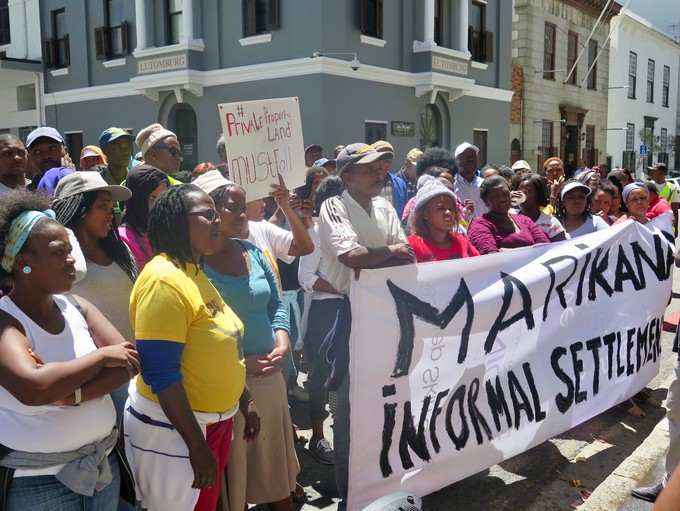
Residents of Marikana and their supporters outside the Western Cape High Court. Photo: Ashleigh Furlong
8 February 2017
What could be a landmark case involving the Marikana informal settlement began on Wednesday in the Western Cape High Court. It could result in the City of Cape Town having to buy or expropriate land on which the Philippi East settlement has established itself.
The owners of the land want the City to purchase the land, or alternatively for the province or national government to aid the City in its purchase of the land. The City, on the other hand, neither wants to buy nor expropriate the land.
Around 60,000 people live in shacks on what is privately owned land. People began settling in 2012, and over the years the numbers have grown.
Numerous evictions and attempts to evict the residents have been made by law enforcement and the the City’s anti-land invasion unit. Some evictions have escalated into violence and GroundUp has documented the use of live ammunition in one such eviction attempt.
Despite the ever present threat of eviction, families have continued settling.
Most of the Marikana residents are represented by the Socio-Economic Rights Institute (SERI), which is also arguing that the City should begin negotiations with the owners of the land to purchase the land or, if an agreement cannot be reached, expropriate the land.
In its heads of argument, SERI says that the occupiers of the land were “forced out of sheer poverty and desperation, to occupy vacant land wherever they could find it”.
According to SERI, the City at first aided one of the landowners in attempts to remove residents from the land, but by mid-2014, it had left the owners to deal with the occupiers. Since residents of Marikana are living on private land, the City claims it cannot be forced to provide services, unless the City itself took ownership of the land.
Today in court, Advocate Peter Hodes, acting for a number of landowners, argued that the City should be compelled to purchase the land and that failing this, the Province should provide the funds.
Hodes argues that expropriation would leave the landowners “in the wholly untenable situation that they will receive as compensation for the property an amount to be determined in accordance with section 12 of the Expropriation Act, property which is, as matters now stand, essentially worthless”.
One of the City’s reasons for not purchasing the land is that it is situated in a noise corridor.
In court, Hodes said that there was “nothing more appalling” than this reasoning. “Can you believe the cynicism of that?” he asked, adding that both the land-owning Fischer family and the 60,000 occupiers have managed to live with the “noise”.
Later, Hodes asked residents of Marikana who sat in the gallery, how many of them couldn’t sleep at night. “The facts are that an eviction is practically impossible. The land is de facto residential,” said Hodes. “The City cannot make an order that is in defiance of reality.”
The City also cites queue jumping as an argument against buying the land; that the occupiers have been placed on a waiting list for emergency accommodation, and that they cannot prioritise them over others on the waiting list. Hodes, however, argued that there was no suggestion that the occupiers moved to the land in an effort to jump the queue.
Hodes also took issue with the City for only contacting the provincial human settlements minister late last year, asking if he could provide additional land and funding so that the residents could be relocated. Hodes said the City has not even had a response.
Evicting the Marikana residents, he said, “would be disastrous for the occupiers, and the prospect [of them] going back to the land is very high”. Hodes noted this happened after evictions in the past.
An eviction order would “almost certainly” result in homelessness. “Nobody wants this,” he said. “[It] cannot under any circumstances be contemplated.”
In heads of arguments, Hodes called the conduct of the state respondents “reprehensible”. “[They] not only failed to act in accordance with their duties, they actively and specifically attempted to distance themselves from these duties.” He called for the state to pay costs on a punitive scale.
The case will continue on Thursday when the court will hear from the other owners of the land.